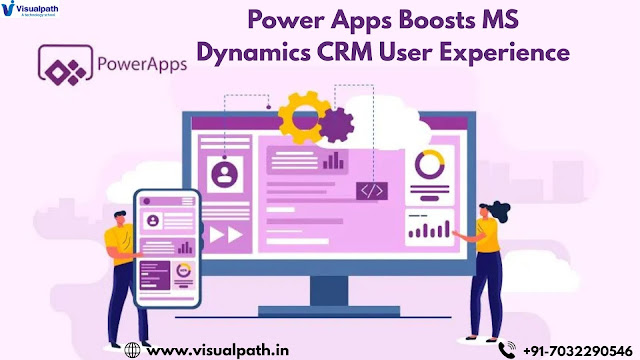- Get link
- X
- Other Apps
- Get link
- X
- Other Apps
Dynamics CRM is already a robust platform, but when combined with Power Apps, it transforms the user experience into something far more intuitive, customizable, and productive. This article explores why integrating Power Apps with Microsoft Dynamics CRM significantly enhances usability, productivity, and user satisfaction — providing the flexibility modern businesses demand.
Streamlining
Customization for Unique Business Needs
Every
organization has unique workflows, data requirements, and customer engagement
processes. Out-of-the-box features in Microsoft Dynamics CRM are powerful, but
may not fully align with specific business processes. Power Apps enables users
to create tailored applications on top of the CRM without needing deep
technical knowledge or costly development efforts.
With
drag-and-drop functionality, built-in templates, and connectors, users can
design personalized interfaces and workflows. Whether it's simplifying data
entry, automating lead assignments, or customizing dashboards, Power Apps provides
a seamless layer of adaptability that traditional CRM customization often
lacks. This helps reduce reliance on IT teams and empowers business users to
take control of their tools.
Enhancing User Adoption
with Simplified Interfaces
User
adoption is a common challenge in CRM deployments. The more complex the system,
the less likely employees are to use it effectively. Power Apps allows for
streamlined, task-focused applications that eliminate clutter and show users
only what they need to see. For example, a sales rep might only require access
to lead data, follow-up reminders, and contact information. Instead of
navigating the full Dynamics CRM interface, they can use a Power App
specifically designed for their role. This simplified approach improves
adoption, reduces training time, and increases overall productivity.
Real-Time Integration with Data and Workflows
One
of the standout features of Power Apps is its deep integration with Microsoft’s
ecosystem. With the Common Data Service (Dataverse), Power Apps communicates
directly with Dynamics
CRM data in
real-time. Users can create apps that read, update, and visualize data without
lag or replication.
This
connectivity extends to other Microsoft tools like Power Automate, Teams,
SharePoint, and Outlook. Automating workflows — such as sending emails when a
case is updated or notifying a manager when a high-value lead is added —
becomes effortless. These automations improve responsiveness and ensure
consistent customer engagement.
Mobile-First Flexibility
In
a mobile-driven world, having on-the-go access to CRM data is a game-changer.
Power Apps enables the development of mobile-responsive apps that integrate
with Dynamics
365 CRM and are accessible across devices —
phones, tablets, and desktops. This feature is especially critical for field
sales, customer support, or service technicians who need up-to-date information
wherever they are.
With
offline capabilities, Power Apps ensures that users can access and edit data
even without internet connectivity. Changes sync automatically once the device
is back online, providing seamless continuity in operations.
Reducing Costs and Increasing ROI
Traditional
CRM customization can be expensive and time-consuming, often requiring external
consultants or developers. Power Apps eliminates much of that cost by enabling
rapid development through low-code or no-code tools. Business units can quickly
iterate and deploy new apps or modify existing ones without waiting weeks for a
dev cycle.
Furthermore,
Microsoft licenses Power Apps under a flexible pricing model, making it a
cost-effective solution for SMBs and large enterprises alike. When businesses
can adapt their Microsoft
Dynamics CRM Online Training
quickly to meet market changes or customer expectations, the return on
investment increases significantly.
Empowering Citizen Developers and Teams
One
of the most revolutionary aspects of Power Apps is its ability to empower citizen developers employees without
formal coding backgrounds — to build and enhance business applications. This democratization
of app development means teams no longer have to wait weeks or months for IT
departments to roll out small changes or new functionalities. Instead, sales,
marketing, and service professionals can build tools that fit their workflows
in real time, directly within the Microsoft Dynamics 365 CRM environment.
Scalable and Secure Innovation
Security and scalability are also major advantages
when using Power Apps with Dynamics CRM. Since both platforms are part of the
Microsoft ecosystem, they adhere to enterprise-grade security protocols and
compliance standards. Administrators can manage user roles, data access, and
app permissions through a centralized interface, ensuring both flexibility and
control.
Conclusion
Combining
MS Dynamics
CRM with Power Apps redefines how businesses interact
with their customer data and processes. From faster customizations and improved
usability to better mobile access and reduced development costs, Power Apps
elevates the CRM experience to a whole new level. It puts the power back into
the hands of the users, enabling them to create smarter, faster, and more
effective customer relationship solutions.
Trending Courses Are: D365
Functional (F & O), Microsoft Dynamics 365 Business Central, Generative AI (GenAI), Project Management Accounting Dynamics 365
Visualpath
is the Leading and Best Software
Online Training Institute in Hyderabad. Avail complete Microsoft Dynamics CRM Certification Worldwide. You will get the best
course at an affordable cost.
WhatsApp: https://wa.me/c/917032290546
Visit: https://www.visualpath.in/online-microsoft-dynamics-crm.html
CRM Training Institutes in Hyderabad
Dynamics CRM Online Training
Microsoft Dynamics 365 CRM Training
Microsoft Dynamics 365 Training Courses
Microsoft Dynamics CRM Certification
- Get link
- X
- Other Apps

Comments
Post a Comment